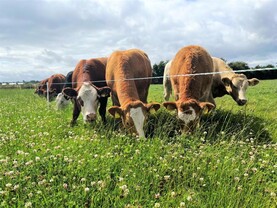While Irish farmers are overwhelmed by weather this spring, which drives up costs for keeping livestock and prevents tillage farmers from planting, a 3c/l increase in the price of diesel may seem like one of the more manageable problems.
It is also true that diesel prices are still some way off the high point of over €2 per litre, but for Irish farmers and agri food exporters, road freight is the only real option for getting livestock to the factory, milk to the dairies and the finished goods to customers in Britain and across Europe.
Irish hauliers have for several years enjoyed a diesel price advantage compared with their counterparts in the UK and it has been common place for northern hauliers and drivers in general to pop across the border to fill up.
North-south comparison
However, the restoration of the full excise duty with the 3c/l increase this week means that the gap in price between north and south has been eliminated and, in some cases, diesel is actually cheaper north of the border.
With further excise duty increases planned by the Irish Government, the likelihood is that the gap will widen as the year progresses. With the price of crude oil creeping up, driven by global instability, there is a chance that the €2/l price could return.
This is a relatively hidden but significant cost for farmers and exporters alike.
Diesel is essential in transporting all farm input costs and it is essential in moving produce off farm to the factory and from there to final markets.
The increased cost of transport has the potential to offset any benefits gained from the reduction in electricity prices.
Global shipping
While there may be an issue with the cost of diesel fuel, there is no issue of supply.
Availability is a bigger issue when it comes to international shipping. The political instability in the Middle East means that cargo shipping has been disrupted between Europe and Asia, with many operators choosing the longer more expensive route around the Horn of Africa as opposed to taking the chance of a missile strike in the Red Sea.
While businesses can and do adjust to slower delivery schedules, the reality is that shipping capacity is reduced because ships are longer at sea making the same delivery.
This will be disruptive to Irish pigmeat and dairy exporters serving the Asian market - it isn’t so much of an issue for beef and sheepmeat, as they are almost exclusively to the UK and other EU markets.
Disruption
This disruption does have one indirect positive benefit for Irish exporters in that UK customers who would be tempted by beef and sheepmeat from Australia and New Zealand are reluctant to switch supplies given the long and uncertain transit journey.
Current cattle and lamb prices in Australia and New Zealand are around half the farmgate price in the UK and are therefore attractive to importers if there wasn’t any concern about reliability of supply.
Ireland’s location next door to the UK will always ensure that the convenience and reliability of supply advantage is retained.






 This is a subscriber-only article
This is a subscriber-only article











SHARING OPTIONS: